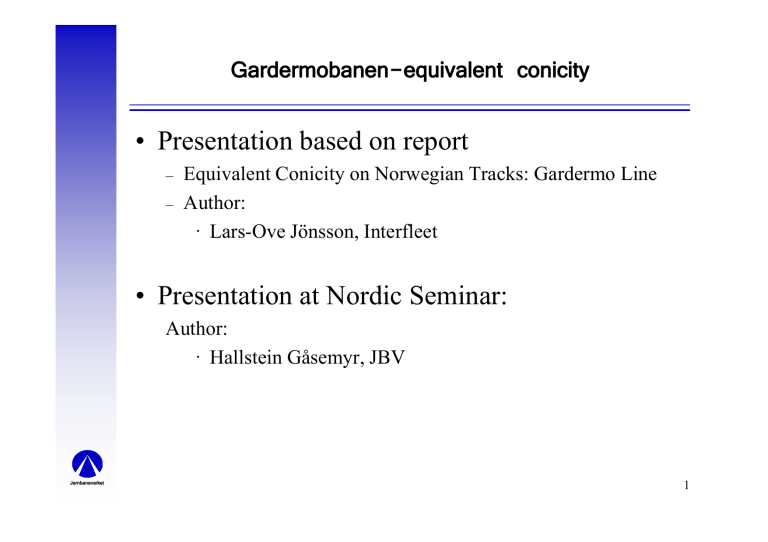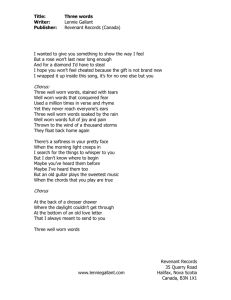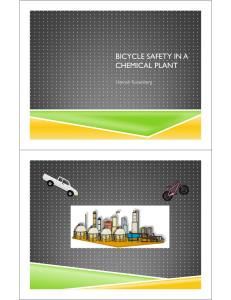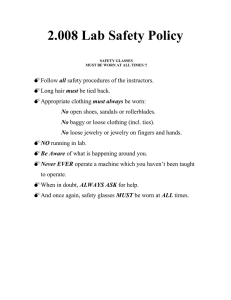
Gardermobanen-equivalent conicity • Presentation based on report – – Equivalent Conicity on Norwegian Tracks: Gardermo Line Author: · Lars-Ove Jönsson, Interfleet • Presentation at Nordic Seminar: Author: · Hallstein Gåsemyr, JBV Jernbaneverket 1 Gardermobanen-equivalent conicity • Contents: – – – – – – Jernbaneverket Motivation Track recording and wheel/rail profile measurements Calculations and Statistical Methods Gardermoen Track Geometry Calculation of equivalent conicity as a function of track gauge · nominal and worn wheel and rail profiles Statistical distribution of equivalent conicity · measured track gauge, worn wheel and rail profiles 2 Gardermobanen-equivalent conicity • Motivation Equivaleent conicity Background is that conicity is a local quantity which is valid at one location only on the track for one wheelset The value obtained depends on the displacement of the wheelset laterally and on the measured track gauge at the defined location on the track A method being demonstrated in this presentation i is i based b d on a proposall from f CEN 256/WG 10 in order to be able to define the conicity for a whole section Lateral displacement [mm] Jernbaneverket 3 Gardermobanen-equivalent conicity • Description of the method: Lateral displacement of the wheelset between 2 and 4 mm is considered. If the flangeway clearance is narrow, then a smaller lateral displacement is applied; if the flangeway clearance < 5 mm, mm then a lateral displacement of 2 mm is used. used Then 2 different local conicities are being calculated, γ mid in the middle of the interval, and γ max which is the largest conicity in the interval 2 to 4 mm. These 2 sizes are being converted into conicities over a whole defined section; due to calculation of a mean value based on local γ mid , respectively the max. value of the local conicties γ max. . In this way informations are given what conicities the wheelset will be exposed for when running on the actual section. The method presupposes rail profiles being measured continuously over the section section. This is not the case in this project. On the contrary, rail profiles have been measured at 12 locations in order to illustrate the method. Hence, the method will give an apprehension of how it could be working, but is of course not correct. The presenting results will therefore deviate from a correct calculation in accordance with the complete method Jernbaneverket 4 Gardermobanen-equivalent conicity • Track quality: Measured with the Track Recording car ROGER 1000 between Oslo and Eidsvoll in April 2011 · In focus: Gauge and curvature – Application of Miniprof Equipment · Worn W rail il profiles fil off type 60E1 on 12 locations l i measured d in i June 2008 – • Wheel Wh l profiles: fil – Application of Miniprof Equipment · Worn wheel profiles P8 and RD9 measured in 2008 • Nominal profiles also applied in the study: – Jernbaneverket – Rail R il 60E1 Wheel profiles S1002, P8, RD9 5 Gardermobanen-equivalent conicity • Wheel p profiles ((nominal)) Wheel profile P8 Wheel profil RD9 Jernbaneverket Distance from back of flange to centre of wheel tread for both profiles: 70 mm For both profiles: Flange angle: 68° Radius in flange root corner: R13 Differencies in geometry of the profiles P8: R87 R100, R87, R100 R330 RD9: R120, R400 6 Gardermobanen-equivalent conicity • Calculation of equivalent conicity – Depending on track gauge (TG) and spacing of active faces (SR), wheelset amplitude y in this work applies: ymax = 4 mm if (TG − SR) ≥ 9 mm ⎛ (TG − SR) − 1) ⎞ ymax = ⎜ ⎟ if 5 mm ≤ (TG − SR ) < 9 mm 2 ⎝ ⎠ ymax = 2 mm if (TG − SR) < 5 mm – Values to be calculated in accordance with amplitude: (tan γ e )mid : (tan γ e )max between for y = (2 + ymax ) / 2 the max imum reached y = 2 mm and y = ymax Applied pp method due to proposals p p in EN 14363 Jernbaneverket 7 Gardermobanen-equivalent conicity • Statistical method applied – Illustration on Bergen Line (from former work) Red lines show tangent track sections of length of 250 m Measured track gauge Jernbaneverket 8 Gardermobanen-equivalent conicity • Statistical method applied Illustration on Bergen Line (continues); three step method applied for calculations due track gauge and nominal profiles – Equivalent conicity, mean value: blue lines: local values red lines: sliding mean values over 100 m green lines: mean value of red line over a length of 250 m Equivalent conicity, max value: blue lines: momentary values red lines: sliding mean values over 100 m green lines: maximum value of red line over a length of 250 m Jernbaneverket 9 Gardermobanen-equivalent conicity • Track gauge and curvature, Gardermoen Red lines: b boundaries d i for f the evaluated tangent track sections;; gauge, curvature Track gauge on almost 90 sections: min. value max value Jernbaneverket 10 Gardermobanen-equivalent conicity • Equivalent conicity has been calculated for nominal and worn profiles g g as a function of track gauges: · nominal P8 and nominal 60E1 · nominal P8 and worn 60E1 · worn P8 and nominal 60E1 · worn P8 and worn 60E1 · nominal RD9 and nominal 60E1 · nominal RD9 and worn 60E1 · worn RD9 and nominal 60E1 · worn RD9 and worn 60E1 · nominal i l S1002 andd nominal i l 60E1 60 1 · nominal S1002 and worn 60E1 – Jernbaneverket 11 Gardermobanen-equivalent conicity • Nominal and worn profiles – Rail profiles (one example of 12 locations) Wear pattern is identified for all rails at 12 locations l ti Jernbaneverket Right Ri ht track, t k km k 32+863 left rail Right track, km 32+863 right rail 12 Gardermobanen-equivalent conicity • Moderately worn wheel profiles; P8; RD9 Wheel profile P8 Jernbaneverket Wear pattern is identified Wheel pprofile RD9 13 Gardermobanen-equivalent conicity • Conicity cal., cal , nominal P8 on nominal 60E1 as function of track gauge Sd: flange thickness A: spacing of activ faces Remarks: Highest values of conicities in interval for nominal track gauge (1433 – 1436 mm) Wheel – rail contact geometry Jernbaneverket 14 Gardermobanen-equivalent conicity • Conicity cal., nominal P8 on worn 60E1 Worn rail profiles measured at 12 locations; equivalent conicity calculated as function of track gauge Track gauge at each location of measured rail profile has not b been applied li d Jernbaneverket 15 Gardermobanen-equivalent conicity • Conicity cal., worn P8 on nominal 60E1 Flange thickness Sd = 28,9 Very high values in the range for nominal track gauge Moderately M d t l worn P8 Wheel – rail contact geometry Jernbaneverket 16 Gardermobanen-equivalent conicity • Conicity cal., worn P8 on worn 60E1 Worn rail profiles measured at 12 locations; moderately worn P8 profile (Sd = 28,9 28 9 mm); equivalent conicity calculated as a function of track gauge Track gauge at each location of measured rail profile has not been applied Jernbaneverket 17 Gardermobanen-equivalent conicity • Conicity cal., nom. RD9 on nom. 60E1 as a ffunction nction of track gauge ga ge Sd: flange thickness A: spacing of active faces Remarks: Low values of conicities in range for nominal track gauge (1433 – 1436 mm) Wheel – rail contact geometry Jernbaneverket 18 Gardermobanen-equivalent conicity • Conicity cal., cal nom. nom RD9 on worn 60E1 Worn rail profiles measured at 12 locations; equivalent i l t conicity i it calculated as a function of track gauge Track gauge at each location of measured rail profile has not been applied Jernbaneverket 19 Gardermobanen-equivalent conicity • Conicity cal., worn RD9 on nominal 60E1 Flange thickness Sd = 27,73 27 73 mm Moderately worn RD9 High values in range of 1436 – 1440 mm Moderately M d t l worn RD9 Wheel – rail contact geometry Jernbaneverket 20 Gardermobanen-equivalent conicity • Conicity cal., worn RD9 on worn 60E1 Worn rail profiles measured at 12 locations; equivalent conicity calculated as function of track gauge; moderately worn RD9 Track gauge at each l location i off measuredd rail profile has not been applied Jernbaneverket 21 Gardermobanen-equivalent conicity • Conicity cal., nom. P8, RD9, S1002, 60E1 P8 and 60E1 S1002 and 60E1 Comparision of equivalent conicities of 3 nominal wheel profiles P8, RD9, S1002 with nominal rail profile 60E1 Jernbaneverket RD9 and 60E1 22 Gardermobanen-equivalent conicity • Conicity cal., nom. P8, RD9, S1002, w60E1 P8 and worn 60E1 S1002 and worn 60E1 Comparision of equivalent conicity of 3 nominal wheel profiles P8, RD9, S1002 with worn rail profile 60E1 RD9 and worn 60E1 Jernbaneverket 23 Gardermobanen-equivalent conicity • Statistical distribution – – – – – Measured track gauge has been applied in order to calculate the conicities along the track Worn rail profiles have been choosen and used randomly from the 12 sets of measured rail profiles There are almost 90 sections The selected rail profile being choosen randomly, is constant for a section · no variation of worn rail profile inside of a section In this way a distribution of conicities have been found Jernbaneverket 24 Gardermobanen-equivalent conicity • Distribution, nom. P8 and nom. 60E1 Equivalent conicity h bee has been calculated l l ted as explained in previous slides: (tan γ e )mid (tan γ e )max Rail profiles have been choosen randomly from 12 locations and is beingg held constant in a section Distribution is shown Jernbaneverket 25 Gardermobanen-equivalent conicity • Distribution, nom. P8 and worn 60E1 Equivalent conicity has been calculated as explained in previous slides: ( γ e ) mid (tan (tan γ e ) max Rail profiles have been choosen randomly from 12 locations and is being held constant in a section Distribution is shown Jernbaneverket 26 Gardermobanen-equivalent conicity • Distribution, worn P8 and nom. 60E1 Equivalent conicity has been calculated as explained in previous slides: (tan γ e )mid (tan γ e )max Rail profiles have been choosen randomly from 12 locations and being held constant in a section Distribution is shown Jernbaneverket 27 Gardermobanen-equivalent conicity • Distribution worn P8, worn 60E1 Equivalent conicity has been calculated as explained in previous slides: (tan γ e )mid (tan γ e )max Rail profiles has been choosen randomly from 12 locations and is b i held being h ld constant in i a section Distribution is shown Jernbaneverket 28 Gardermobanen-equivalent conicity • Distribution nom. RD9 and nom. 60E1 Equivalent conicity has been calculated as explained in previous slides: (tan γ e )mid (tan γ e )max Rail profiles have been choosen randomly from 12 locations and is being held constant in a section Distribution is shown Jernbaneverket 29 Gardermobanen-equivalent conicity • Distribution nom nom. RD9 and worn 60E1 Equivalent conicity has been calculated as explained in previous slides: (tan γ e )mid (tan γ e )max Rail profiles have been choosen randomly from 12 locations and is being held constant in a section Distribution is shown Jernbaneverket 30 Gardermobanen-equivalent conicity • Distribution, worn RD9 and nom nom. 60E1 Equivalent conicity has been calculated as explained in previous slides: (tan γ e )mid (tan γ e )max Rail profiles have been choosen randomly from 12 locations and is being held constant in a section Distribution is shown Jernbaneverket 31 Gardermobanen-equivalent conicity • Distribution, worn RD9 and worn 60E1 Equivalent conicity has b been calculated l l t d as explained in previous slides: (tan γ e )mid (tan γ e )max Rail profiles have been Ch Choosen randomly d l From 12 locations and is Being held constant In a section Distribution is shown Jernbaneverket 32 Gardermobanen-equivalent conicity • Conclusions Equivalent conicities of Gardermoen Airport Line have been shown – Measurements g g · track gauges · nominal and worn wheel and rail profiles – Statistical methods have been applied · Three step method for mean and max values – Results are considered as satisfactorily · For most cases the simple formula is satisfied: – (tan γ e ) ≤ ⎜⎛ 0,50 − ⎝ Vlim ⎞ ⎛ 210 ⎞ ⎟ = ⎜ 0,50 − ⎟ = 0,29 1000 ⎠ ⎝ 1000 ⎠ Jernbaneverket 33


